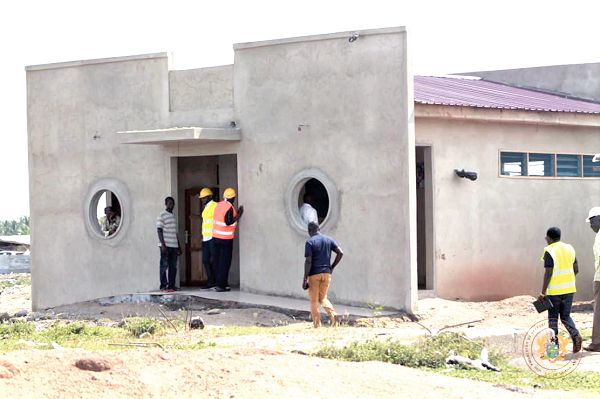
Ningo Prampram benefits from $1m per Constituency policy
The Ningo Prampram Constituency in the Greater Accra Region has benefitted from an ambulance and sanitary facilities funded under the government’s $1 million per constituency programme to enhance living conditions in the area.
The sanitary facilities include three community-based water systems that comprise two standpipes with four taps, a 10,000-litre water storage tank and solar-powered submersible pumps.
They also include places of convenience that are under construction.
The facilities are being provided under the government’s Infrastructure for Poverty Eradication Programme (IPEP).
Speaking to the Daily Graphic in Accra yesterday, the Minister of Special Development Initiatives, Ms Mavis Hawa Koomson, under whose ministry the IPEP is being facilitated, said three places of convenience were currently under construction at Old Ningo Bantama, New Ningo (Adainya) and Afienya Zongo.
She said the three community- based water systems had also been sited at New Ningo Mangbaljase, Okyebleku and Old Ningo Avetapa communities under the Water for All project.
“While some of the projects are nearing completion, others are still at the initial stages.
The constituency is also getting the ambulance under the One Constituency, One Ambulance policy,” she said.
Ms Koomson said the government was currently carrying out 3,020 priority projects under its IPEP initiative.
In addition, the government is providing all the 275 constituencies with an ambulance each, as well as undertaking other constituency-specific projects such as markets, community centres, drains, culverts, clinics, classroom blocks and small bridges as part of the programme.
Project breakdown
Ms Koomson explained that the implementation of the IPEP was taking two approaches — the top-down approach, which constitutes the government’s priority projects, and the bottom-up approach, which constitutes community infrastructure based on needs assessment (constituency specifics).
She said the government’s priority projects comprised 1,000 community-based water systems, 501,000 tonne capacity warehouses, 570 small irrigation dams, other constituency specific projects, among others.
Giving a breakdown of the ongoing government priority projects by region, Ms Koomson said 565 were ongoing in the Northern Region, 335 in Upper East, 251 in Upper West and 217 in the Eastern Region.
The others are 291 in the Ashanti Region, 183 in Brong Ahafo, 159 in Volta, 208 in Greater Accra, 250 in Central and 164 in the Western Region.
Second component
Ms Koomson said the processes for the implementation of the second component of IPEP, which is constituency specific, were far advanced.
“Through the IPEP, every constituency has been allocated the equivalent of $1 million to finance basic infrastructure needs of its constituents, especially those in the rural and deprived communities.
These are aimed at eradicating poverty and reducing inequalities in the beneficiary communities,” she said.
Ms Koomson said the warehouse initiative comprised a laboratory, a washroom, a solar-powered borehole, solar dryers, resting areas, offices and a fence costing GH¢1.8 million each, while the small dams and dugouts also cost between GH¢200,000 and GH¢250,000 each.
She said all the projects were expected to be delivered by the close of 2018 or early 2019.
IPEP
In October 2017, President Nana Addo Dankwa Akufo-Addo launched the IPEP to facilitate the government's priority initiatives for sustainable socio-economic development.
The broad projects under the programme include the One District, One Factory, One Village, One Dam, Agricultural Infrastructure, Water for All and Sanitation programmes.
Under the programme, the government promised to give $1 million annually to each of the 275 consistencies to be invested in infrastructure development for the successful implementation of those initiatives.
To ensure the smooth advancement of the programme, the government established three development authorities — the Northern Development Authority, the Middle Belt Development Authority and the Coastal Development Authority — to oversee its implementation.
The development authorities were expected to engage the private sector for the implementation of the programme.
Writer’s email
